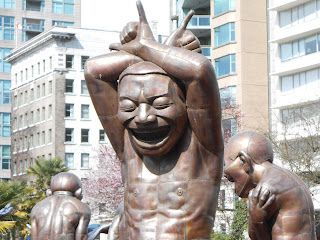I am a person who receives Social Security, and began to do
so just before I turned 63. Because I was for years a woman who didn’t work
outside the home and never remarried after my divorce, I became eligible for my
former husband’s benefit, which was double that of what I had accrued in my own
work history.
For twenty years, I had worked as a bookseller, first as a part-time
employee, then full-time as my children grew older. Over time, my back and
shoulders began to deteriorate and now I have almost monthly episodes of
debilitating pain, where my activity level sinks to absolute zero and I am
often sleepless, unless I take Advil PM.
My Social Security check is higher than most, thanks to my
husband. My own Social Security earnings have gone back into the system, so
that I am actually draining the fund only of what I earned myself. The excess
is offset by what I accrued and didn’t take. This is true of anybody who earned
a wage that was taxed for Social Security payments, and then chose to forgo
their earnings in favor of a spousal benefit instead.
I am part of the Baby-Boom Generation that exceeded in
numbers any that came before us. Most of us grew up in a time when the
unemployment rate was miniscule and we were blessed with jobs, unlike many in
our country today, The benefits we provided to our predecessors for Social
Security went to a smaller number of people than those of us who were providing
them—and in many cases our wages were higher than the money made by those who
went through the Depression. There
should have been a surplus of money but it was used for other purposes by our
government.
Now there is great concern for the generation that follows
us who are responsible for our benefits, and I share that concern. If our
government had repaid the money they have “borrowed” from the Social Security
fund, this would not be a flaming issue today. I believe our government owes it
to everyone, recipients of Social Security and those who are paying into the
system, to find ways to replenish the funds that were used for other purposes.
There should be an income-cap on those who receive benefits—people
with fat pensions should not receive a monthly Social Security check. Crack
down on under-the-table wages by giving anyone in this country a right to work
and the responsibility to pay into the system—then police employment venues notorious
for paying off the books (restaurants, landscaping businesses, sweat shops).
Within the realm of the Social Security Administration itself, there are people
who are capable of finding far more creative solutions than I, ones that will
not break the contract that has been made with the people of our country.
Much controversy rages over the cost of living increase of
Social Security benefits and I’m going to add to it. Stop it. It’s a joke. Last
year my increase amounted to $25 additional dollars a month. My rent also
increased by $25 a month. Food costs have risen quite a bit. That extra $25
meant nothing in the scheme of how I live my life. If it will help the system,
get rid of it. But also get rid of cost of living increases for our elected
officials in Washington, they who pull down very decent salaries and receive
health care subsidies too. Fair is fair, as we used to say in the schoolyard.
Speaking of health care, next month my check will be reduced
by $100 to help provide me with Medicare. No. It’s not free, for those who
labor under that delusion, and for those who receive less in their monthly
check than I, this is a steep cut in income. (I know because it provides a
substantial pinch for me.) It also is not a guarantee that we can get health
care when we need it. There are co-pays and out-of-pocket deductibles, which
not all of us will be able to afford. The medical establishment has come up
with credit cards for anyone to use, with exorbitant interest rates, so that
health care will be available to all—along with soaring debt. Is this the best
solution that America
can come up with?
I’m happy to have any sort of health care because I’ve gone
without it for decades. I have never accepted any sort of government assistance
as a single parent or as an aging woman with no health insurance. I have paid
into the system that now sends me a monthly check, with my own payroll
deductions and payments from my employers which otherwise might have come to me
as income. I never begrudged that bite into my rather meager salary because I
was helping to fulfill a promise that I believed in.
My generation believed in that promise. Now we are “a drain
on the federal budget.” To those who flinch at our numbers, I ask them to look
at statistics. More American women are dying at younger ages than ever before, and given
the frailty of approaching years, most of those women are the ones who are
aging. Men, of course, traditionally live fewer years than their female
counterparts. Just so long as our health care system, eager for Medicare dollars,
doesn’t prolong our lives with modern medical miracles, our shelf lives will be
short. Our Social Security checks will go back into the system for the next
generation, unless of course our government decides they need it more than the recipients
do.











